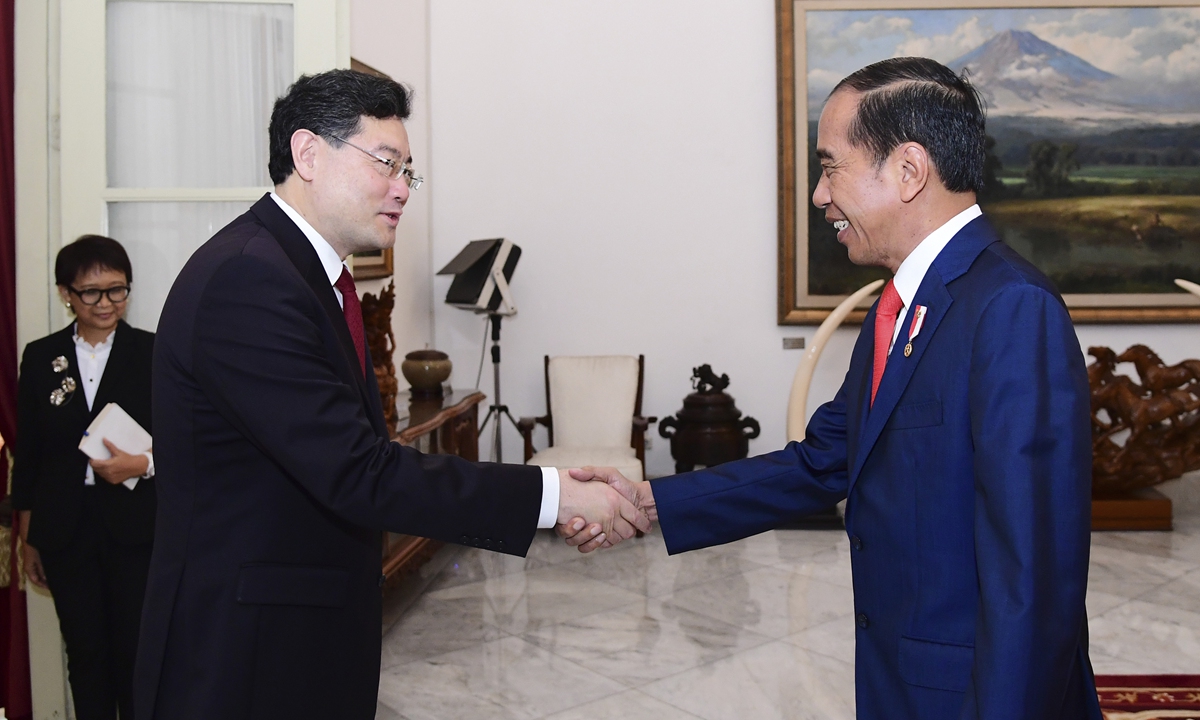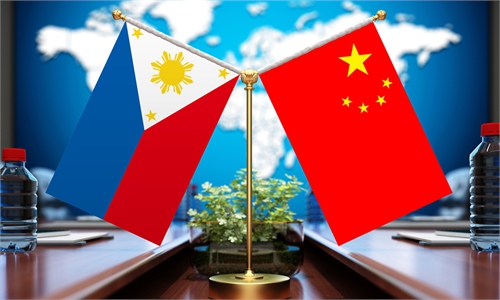
Indonesian President Joko Widodo greets Chinese Foreign Minister Qin Gang during their meeting at Merdeka Palace in Jakarta, Indonesia on February 22, 2023. Photo: VCG
Chinese Foreign Minister Qin Gang on Wednesday stressed that a Cold War or big power competition should not emerge in the Indo-Pacific region, and ASEAN members should not be forced to take sides, after meeting with his Indonesian counterpart Retno Marsudi.
Observers believe Qin's remarks not only deliver China's message to regional members to retain their strategic independence, but express China's hope that ASEAN remains wary of being used by external forces to counter China.
Qin made the comments at a press conference held with Retno, during which he said he believes ASEAN members can make independent judgments and choices based on the region's interests. China supports ASEAN members' strategic independence and unity and opposes confrontation and bloc politics, according to a readout published by China's Ministry of Foreign Affairs on Wednesday.
Indonesia is committed to regional peace and prosperity and ASEAN should not become a proxy for any power, said Retno. She stressed that as Indonesia takes up the bloc's rotating chairmanship, it will strengthen cooperation with China.
On Wednesday morning, Qin also visited President Joko Widodo at the Presidential Palace in Jakarta, where the president "conveyed the importance of Indonesia and China being the engine of peace and stability in the region, as economic development cannot be carried out without peace and stability," according to a statement from the palace.
The trip marks Qin's first overseas visit since he took office as China's Foreign Minister in the New Year, which experts believe showcases the special importance China attaches to its ties with Indonesia, as well as ASEAN.
Chen Xiangmiao, director of the world navy research center at the National Institute for South China Sea Studies, said the statement from Qin signals not only China's hope that the ASEAN can remain independent from big power competition, but also remind it to avoid being used by external forces, namely the US, to counter China.
Washington has upped the frequency of its activities in the region to sow discord between China and the bloc in recent years. The most recent case is the US trying to hype the friction of the "laser incident" between China and the Philippines to sabotage bilateral relations.
Luckily, from Retno's statement, it is clear that the bloc adheres to its independent strategy, and will not fall into becoming a pawn for certain forces, according to Chen.
In Jakarta, Qin chaired the fourth iteration of both nations' Joint Commission on Bilateral Cooperation (JCBC), which was last held in Beijing in 2018. The consensus said that both sides, along with other ASEAN members, will seek full and effective implementation of the Declaration on the Conduct of Parties in the South China Sea and expedite the South China Sea Code of Conduct (COC).
The negotiation of the COC has made certain progress during the years, while it was shadowed by the COVID-19 to certain degree during the past three years. Chen, however, is positive that negotiations on the code will continue this year.
"First of all, face to face negotiations will resume as countries have entered the post-pandemic era. More importantly, competition over the South China Sea has intensified over the past years as external forces, such as the US, UK and Australia, try to make waves in this region, thus the bloc believes a COC is needed to give this area an institutional safeguard," Chen said.
The consensus includes deepening cooperation on all fronts, be it political, economic and people exchanges. The two ministers discussed how to ensure the Jakarta-Bandung High Speed Railway (HSR) in Indonesia would open to passengers on time, so that China will import more staple commodities, agricultural and fishery products from Indonesia and the two countries will expand cooperation on green development, digital economy and healthcare.
China is Indonesia's largest trading partner, with bilateral trade surpassing $100 billion in 2021, up by 58.6 percent year-on-year. China has been a major market for Indonesia's products such as palm oil, coal, steel, bird's nests, coffee and tropical fruits.


